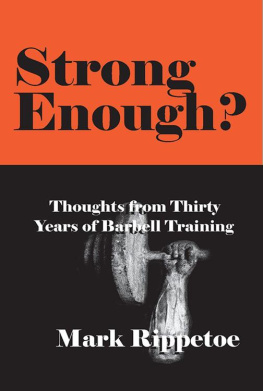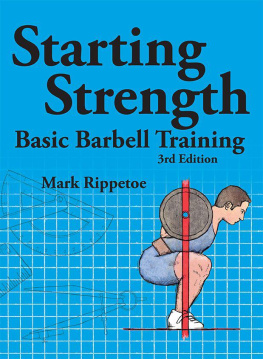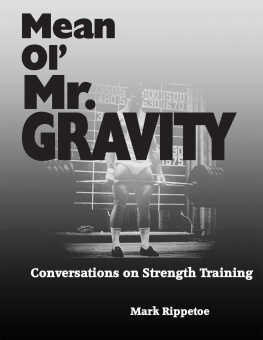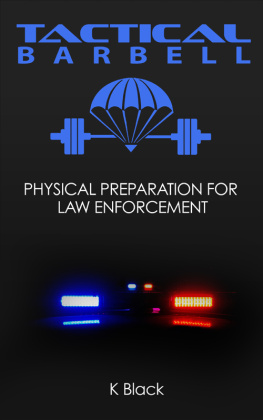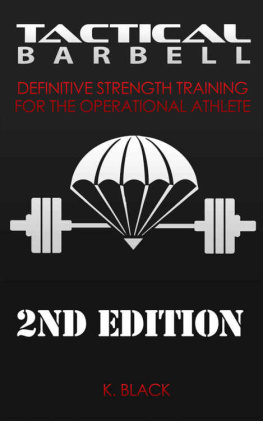Strong Enough?
Mark Rippetoe
Revised digital edition 2010 The Aasgaard Company
Print edition 2007 The Aasgaard Company
All rights reserved. No part of this publication may be reproduced, stored in a retrieval system or transmitted in a form by means, electronic, mechanical, photocopied, recorded, or otherwise without the prior written consent of the publisher. The author and publisher disclaim any responsibility for any adverse effects or consequences from the misapplication or injudicious use of the information presented in this text.
Editor, Layout, and Digital Conversion Stef Bradford
Copyeditor Carrie Klumpar
Illustration Lon Kilgore
The Aasgaard Company
3118 Buchanan, Wichita Falls, TX 76308, USA
www.aasgaardco.com
Contents
"The metaphor I'm working with is this: MillBudCoors drinkers are the bench pressers of the beer world. They've lost sight of the subtlety that beer is capable of and have opted to drink a brew that does little for them besides allow them to drink a lot of it. Those who choose to go Overhead choose a beer that, while similar upon first glance to MillBudCoors, gives them a much fuller experience a beer that challenges them."
Brock Jones on brewing a better beer
The Slow Lifts
The "slow lifts," the squat, the press, the deadlift, and the bench press, form the basis for any effective program that attempts to improve strength. And strength is very important. It is the difference between a very effective varsity athlete and a benchwarmer, an independent older person and a nursing home resident, a correctly utilized gym membership and a waste of money.
When I was a little boy, my daddy took me to work with him at his caf. He worked long hours and would never have gotten to see me if I hadn't gone back to work with him in the afternoons, after his well-deserved and often interrupted nap. One of my favorite people to see at the caf was the shoeshine guy from the barber shop on the corner. Roosevelt Pope was in his 50's at the time, and had social conditions differed in the early 1930's when he was young, he would have been an amazing athlete. As I remember, he was about 5'10" at probably 190 lbs., with an athletic bearing and a broad sense of humor. Roosevelt had nice big arms, but I don't know if he trained them. At the time I didn't think to ask. He brought me bubblegum from the barber shop, even though I wasn't getting a haircut, and would always tickle me a little, like loving normal adults used to be able to do to children back then.
I was always fascinated by Roosevelt's hand strength, and the things he would do to show me. He could take a stuck lid off of a jar that would embarrass my dad. He could bend a bottle cap between his thumb and his ring finger. He could do other things that I don't remember at 45 years removed, but the impression he made on me was one of confidence and power that elevated him in my esteem way above that which the unfortunate circumstances of the day would otherwise have dictated. And he was a nice man. He brought me bubblegum without even having to get a haircut.
I look back to 1961 and I see clearly that strength means way more than the ability to generate force against a resistance. It has always meant capability. It has always been the means by which people accomplished things that required them to interact with their environment. Its acquisition has always improved the acquirer in more ways than intended.
Strength is the ability to generate force against a resistance, irrespective of the movement produced by doing so. If the resistance doesn't move at all, the force exerted is still measurable with the right tools, and the muscular effort used is said to be "isometric," where the muscles stay the same length. If the movement of the resistance is controlled by something other than the muscular effort (by the exercise or measurement device) the movement is said to be "isokinetic." This is a silly thing, like a quadriceps isolation, since it does not occur in nature, or under any circumstances which the human body is designed to accommodate.
When we consider movement that is controlled by the muscular force applied to the resistance, power becomes an important concept. Power is force applied to a resistance that causes the object providing the resistance to accelerate , or change velocity. Force applied to a stationary force plate is a measurable quantity, but it is not power. Movement is required before power exists. In the weight room, if the weight on the bar stays the same, the faster the bar moves the more power that has been applied to it. If the weight gets lighter, it's obviously easier to move faster, so power would depend on how much faster it gets moved. As the weight decreases, power actually goes down in humans, due to the inability of a human to continue to make it go faster and faster the lighter it gets (humans have limitations inherent in the nervous system and the contractile mechanism of muscle tissue that machines don't have), and since as the weight approaches zero this limit velocity takes less and less force to acquire. Same with a heavier weight, but as the weight increases to the point where it's too heavy to lift at all, power decreases all the way to zero, since movement is required for power. At a 1RM, force is very high while power is very, very low. Powerlifting really is misnamed.
Power the ability to accelerate may be the most important ability to display in all sports, even those involving only the accelerated movement of the body, like gymnastics and diving. In two athletes with exactly the same skill level, the more powerful of the two will be the better athlete, since the more powerful one can utilize those skills more efficiently.
In all of sport, the highest power outputs ever measured occur during the second pull of the snatch. I would guess that the lowest would occur in the posedown at the Mr. Olympia, but I may be wrong.
Strength contributes to power by providing the force involved in the acceleration, which is obvious. Equally obvious is the fact that strength improvement will improve power, although there are other factors involved that depend on the nervous system efficiency of the individual.
Less obvious is the subtle role that strength plays indirectly in the execution of the movements dependent on power, both sports skills and power-dependent training exercises. In all expressions of power, there are elements of the kinetic chain that generate the force that produces the acceleration, and there are elements that transfer the force to the resistance.
For example, in a clean the power is generated by the extension of the knees and hips applied by the feet against the ground, and it is transferred up the back and down the arms to the bar. The efficient transfer of power along the trunk segment is possible only if the muscles that stabilize the trunk are able to hold it in perfect isometric contraction during the transfer. Any laxity in the back causes some of the power that would ideally get to the bar to be absorbed. In the same way that towing a car with a long spring is not as good an idea as using a chain, a mobile segment absorbs force that an immobile segment would transmit.
The muscles that hold the segment immobile are therefore critical to its function in the kinetic chain. A loose back during the clean produces an unfinished pull, as well as an unpredictable bar path, since varying amounts of force get to the bar. And the muscles' ability to hold an isometric contraction depend on their ability to produce sufficient force to hold all the mobile segments of the vertebral column perfectly immobile while a tremendous force is trying its best to move them.
Next page
